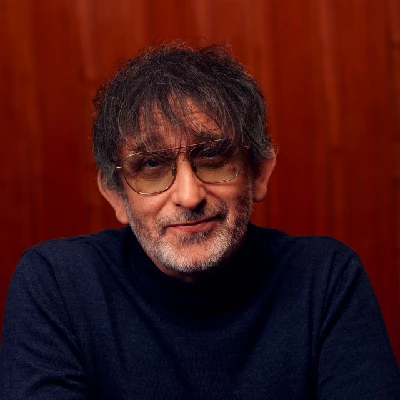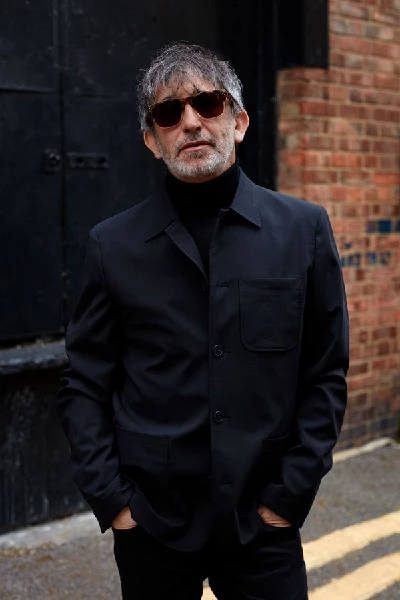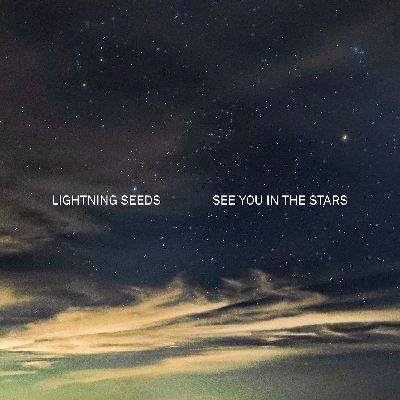published: 7 /
1 /
2023

Lightning Seeds' frontman Ian Broudie talks to Fiona Hutchings about his band's new album 'See You in the Stars' and vinyl.
Article
For a quite long time, a lone man called Ian Broudie was the band known as The Lightning Seeds. Named after a misheard Prince lyric in the hope that said band would one day become a reality, he pressed 500 copies of his debut single ‘Pure’ and hoped. The simple song about raindrop splashed rainbows caught the ear of one John Peel. Eventually success did indeed follow.
Following the success of the aforementioned single The Lightning Seeds, which had expanded into a full group, became an ever present musical force during the 1990s with five albums scattering hits like confetti all over the decade, regardless of what grunge or Britpop or even Eurodance music was sitting next to them in the charts. From the slow, slinky ‘You Showed Me’ to the more biting ‘Lucky You’ via the upbeat ‘Marvellous’ and, of course, the (un)official anthem of any England international match since 1996, The Lightning Seeds had a song for every occasion.
But as the new millennium dawned, the now real flesh, bone (and blood in the case of guitarist Riley Broudie) Lightning Seeds seemed to slow right down. Their new album, ‘See You In The Stars’, is only their second since 1999’s ‘Tilt’ and it’s worth the wait. An opportunity to chat to the man behind many of my favourite songs is a gift I am not going to pass up.
I am aware that Ian has been doing interviews all day as we connect in the late afternoon over Zoom, but if he’s starting to feel tired of answering questions there is no sign of it as he waves hello and we simultaneously express relief that the technology is working. In fact to start with he is the one asking me the questions. He wants to know all about Pennyblack and where we are based. He is self-depreciating, telling me he’s still fascinated with the fact that music can now be released simultaneously across the world. “I said to Riley the other day, ‘I wonder when it comes out in France’ and he’s like, ‘it’s on Spotify everywhere in the world on the same day’ and I was like, ‘Oh yeah, of course!’”
This leads to a discussion about the wonders of both Spotify and vinyl. After all you can be a fan of both. He tells me about a conversation he had a few days previously about listening to music. “They said, ‘Have you got a record player in the house?’ and I said, ‘Well, it’s in storage at the moment and they said, ‘How do you get by?’ I said, ‘If I like an album I buy the vinyl but I might never play it and I listen to it on Spotify instead.’” “Yes”, I agree enthusiastically, “That does make total sense.” Despite what my husband might think this is the correct way to go about things. Vinyl, especially precious to me vinyl, feels too risky to actually play these days. I have two teenagers and four cats. Not everyone understands the respect and care vinyl requires. Ian laughs. “Right. Plus people who aren’t used to records just treat it like ( he gestures carelessly dropping the needle/being rough/maybe scratching the record) and you’re like. ‘No you don’t do that!’” I tell him that despite having a promo digital copy of the new album I have also pre ordered the vinyl, which I won’t play. (Plus I know he means what he says because on the band’s website you can order the vinyl with the album on CD as a package.). Plus, we reflect together, there is something important about physically owning music that matters to you. I don’t tell him my copy of ‘Like You Do’ the 1997 hits compilation is in a very battered and cracked case because it is so important to me, but I suspect he would understand it if I had.
PB: It’s been a long time since the last Lightning Seeds album. What else have you been up to because I’m guessing you haven’t just been sittong around at home?
IB: Well, I’ve done a fair amount of sitting around at home actually! The last album came out about fifteen years ago. I didn’t feel it had the things about it that were The Lightning Seeds and I felt like maybe I’m not that fella anymore. Also a lot of other stuff was going on in my life, the aftermath of being very busy and in the charts and all that. Then there were a lot of family bereavements so it was a funny old time. I was like, should I have spent the last 20 years worrying about someone’s drum? Whether it sounds OK or whether this guitar is in tune? I thought I need to cut that out my life and live in the moment you know. I tried doing a bit of that, but it didn’t work out, usually ended up with me being drunk or something stupid. And then I finally, very slowly worked out, no, you are happy when you’re worrying about a drum, when you’re worrying about whether a guitar is tune and you’re sat amongst musical equipment!
Then I was enjoying the life of a troubadour and not worrying about putting myself on the line with a record. I wasn’t sure I really wanted to go through all the stuff you have to do. Then when you get songs, and it stops being an abstract idea, you’re like I’ve got this song and I’d really like to play it to people. I think people who like my records would like this song. You think maybe I should make a record. Then I get another one (song) and then the process starts. Just when you think you’re out it drags you back in. I’m really proud of the record and I think it's the right record for me to make at this minute. So, it’s good and we get to do a tour. It’s a nice moment.
PB: I am coming to see you in Sheffield.
IB: At The Leadmill! One of my first ever gigs was at the Leadmill. Me and Terry Hall. I was really scared to get up there on stage so we put a few gigs in and the idea was if you do it with your pal and he’s singing then you won’t feel so bad about singing too. I remember being terrified and The Leadmill felt enormous to me at that time.
There is a brief interlude when we talk about me seeing him in Sheffield City Hall in 1999 and how security refused to let us stand up and move, despite the audience wanting to and Ian’s encouragement from the stage. Ian also recalls a gig around the same time in Leeds, where despite still being quite shy on stage, he had to say something when the ushers were shushing people singing along! In true Sheffield vs Leeds style I feel vindicated somewhat that we were allowed to sing along at least!
PB: I’ve seen in a previous interview where you’d said you don’t necessarily finish a lot of songs because you quite like that state when they’re unfinished and could become anything. Was it anything that pushed you to finish the songs for this album?
IB: Well, I’ve got this weird way of working. It’s not a good way of working. It’s an awful way of working. Next album I do I’m going to try terribly hard not to work that way and I’ve said that probably before every album I’ve made.
When I write, I talk into my phone. I always want to get a great melody. I talk about how I think that melody would make me feel (to) get an idea that’s not just music more like a painting. I might have a guitar or I might just be talking but it’s always a bit out of tune. Then when I go through the memos, it might be a year later, if there’s any that sound even vaguely like they’ve survived this horrible treatment, feel they’ve earned, deserve looking at. Then I’ve found that the recording process and the writing process it kind of becomes one. I change things. It’s all moving around. It’s very hard for anyone to help and it becomes quite a solitary process because no one else can really get involved and help. So, it’s not good and I’m really not going to do that again… I’m going to try hard not to do that next time.
There are a few songs that aren’t finished and didn’t go on the album. It’s not because they’re not the best ones. They’re just the ones I’ve not got to finishing yet. So, I feel like I’ve started the next album because I’ve got quite a few that I think are really good.
I think what I’ve said in the past is that songs are at their most beautiful when there’s all these things that you imagine it could be. It could be ‘California Dreamin’ or it could be ‘I Feel Love’. They’re just ideas. Obviously when they become something they stop being everything else. So, you have a second thought where you listen to them and you think is something worth framing and putting on the wall? On this (album) a lot of people were very encouraging.
A band I was producing called The Coral, the singer James… He’s now a producer and our roles are reversed, and he was going, “I’d love to do a song… why don’t you come on over and do a song? I’m always in the studio and I’ll produce the song and finish a song.” Eventually I went up to Liverpool for two days and we finished a song and in a way that was quite a big moment because then I had a song finished and then people kept getting in touch saying - people I wouldn’t have played it to – who he’d played it to, saying “This is great” and I’m like, “Oh, thank you!” Then you’ve got a song and I’m thinking I’d like to get another one and then I’d have a few to play and really that’s an album. It sort of grew out of him getting me to finish something!
Ian apologises for the long answers but I am fascinated and tell him so. Plus it sounds like the wait for the next Lightning Seeds album might not be so long which is exciting.
PB: I know you collaborated with Terry Hall who you’ve worked with for a long time. I’ve always seen The Specials at one end of the optimism spectrum and the Lightning Seeds at the other end of the optimism spectrum. I just wondered how it works when you write together on a song like ‘Emily Smiles’ from this album. That’s a gorgeous song with a vibe that I don’t (and I’ll probably have to apologise for this if I ever meet him) associate with Terry Hall.
IB: I think there’s a lot of sadness within the positivity of the Lightning Seeds and I think with Terry’s songs, like ‘Our Lips Are Sealed’, you know Fun Boy Three songs, I think there’s a lot of optimism through a wry smile in those songs.
We’ve been friends for a long time, so I think it’s easy for us to work together because we’re mates. There is something that happens between the two of us that’s good when we write together. For ‘Emily Smiles’, we didn’t really discuss it a lot and it was more collaborative than we’ve done in the past. Sometimes he’ll just do the lyric and I’ll do the music but we actually worked on it quite a bit together in the same room and it almost became something as it was happening. I think it’s about the idea that you are next to people all the time but there’s a million miles between you. You’re making chit chat and whatever and there’s this big gulf. The thing that’s quite simple, that just cuts through that distance and opens everything up, is a smile. When somebody smiles everything changes. I don’t know if that’s positive or negative really. It’s just an observation.
PB: I think that’s fair. I was oversimplifying it. One of the things I’ve always loved about The Lightning Seeds is something can sound very upbeat and cheerful but if you pay attention to the lyrics there’s something else going on. On this album, there’s a couple of different tracks like ‘Great to Be Alive’, which on the surface of which could be seen almost like an Instagram quote but that hit me really powerfully for a couple of reasons. I wondered if there was anything in particular that inspired that. You’ve also got songs like ‘Fit For Purpose’ and ‘See You In The Stars’ which have been inspired by people you’ve lost.
IB: ‘Great to Be Alive’ was the first song I finished, the one that made me think I’d like to do more with this. It’s a strange song because you could view it as negative but you could see it as positive. What I’m saying is every day you’re a sightly worse version of what you were before. You know hope lives in young men’s hearts. I think it’s true. I have trouble believing in anything. Then I think I reach a point where I’m just like this is such a first world problem. It’s fucking great to be alive! It’s great and tell yourself that. So in one way it’s very positive because it’s that and the other way it’s, yeah, you’re not quite as good at anything as you were.
PB: When I was reading a bit of the history I saw that your first band was Big in Japan with Bill Drummond, Holly Johnson and Clive Langer. You’ve worked as a producer for pretty much everyone at this point. Is there anyone left you’d like to work with as either a musician or a producer?
IB: Well\ I stopped producing around 15 years ago, that time I was talking about earlier, feeling I didn’t want be in that room anymore. I prefer to be in that room doing my own songs and I love playing live.
There probably are people I’d like to work with but I can’t think of any! I think it’s a mixture of things. You hear something and you think it’s brilliant so there’s nothing for you to do. Sometimes you hear something and you think they are great but this isn’t right and it could be a lot better. I think that’s the thing (Ian clicks his fingers) that goes off for me where if there’s someone I really like and I think I could make that better then that kind of gives me the confidence to pipe up. So if I was in a room with Alex Turner there’s nothing I could offer him really. He’s just very good at it all. He knows what he’s doing so he doesn’t need me so I probably wouldn’t actually like to work with him, even though I think he’s very very good. There are loads of people I think are fantastic but then the ones I think are fantastic don’t need me!
PB: I guess that makes you different from some producers then. Some seem to do things to records just to make it sound like they’ve had a hand in it.I think knowing that is probably a valuable skill you have in knowing the difference.
IB: I’ve always been a very reluctant producer. Someone’s had to convince me to do it because it’s not something I’ve aspired to be, I don’t even like the idea of producers particularly. Now if I work with anyone it would have to be a collaboration and I am working with someone next week for the first time in ages. I’ve agreed to do something but I’ve said I’ll collaborate with you on some tracks but this whole idea of being the producer I’m not into it at all really.
And then our time is very nearly up with more questions filled away for next time. We laugh about reaching the point where our kids really are in charge of us (his son Riley is also his manager) and I tell him I am looking forward to seeing him in The Leadmill in a couple of months time. I genuinely can’t wait. The promise of seeing so many classics both old and new performed in one of the best venues (#savetheleadmill) in Sheffield promises to be a night to remember.
Band Links:-
https://lightningseeds.co.uk/
https://www.facebook.com/thelightnings
https://twitter.com/Lightning_Seeds
Play in YouTube:-
Have a Listen:-
Picture Gallery:-

